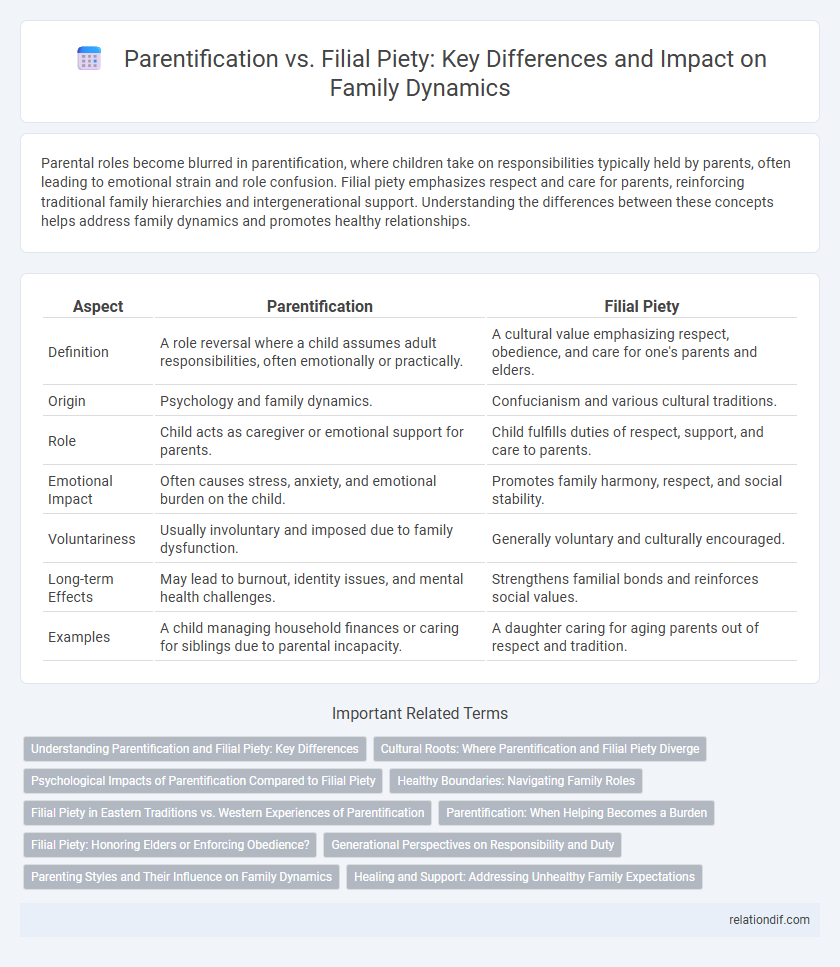Parental roles become blurred in parentification, where children take on responsibilities typically held by parents, often leading to emotional strain and role confusion. Filial piety emphasizes respect and care for parents, reinforcing traditional family hierarchies and intergenerational support. Understanding the differences between these concepts helps address family dynamics and promotes healthy relationships.
Table of Comparison
| Aspect | Parentification | Filial Piety |
|---|---|---|
| Definition | A role reversal where a child assumes adult responsibilities, often emotionally or practically. | A cultural value emphasizing respect, obedience, and care for one's parents and elders. |
| Origin | Psychology and family dynamics. | Confucianism and various cultural traditions. |
| Role | Child acts as caregiver or emotional support for parents. | Child fulfills duties of respect, support, and care to parents. |
| Emotional Impact | Often causes stress, anxiety, and emotional burden on the child. | Promotes family harmony, respect, and social stability. |
| Voluntariness | Usually involuntary and imposed due to family dysfunction. | Generally voluntary and culturally encouraged. |
| Long-term Effects | May lead to burnout, identity issues, and mental health challenges. | Strengthens familial bonds and reinforces social values. |
| Examples | A child managing household finances or caring for siblings due to parental incapacity. | A daughter caring for aging parents out of respect and tradition. |
Understanding Parentification and Filial Piety: Key Differences
Parentification involves a child assuming adult responsibilities and caregiving roles typically meant for parents, often leading to emotional burden and role reversal. Filial piety, rooted in cultural traditions especially within East Asian societies, emphasizes respect, obedience, and care for one's parents and ancestors without assuming inappropriate caregiving roles. Understanding these key differences highlights that parentification disrupts healthy family dynamics by imposing undue stress on children, whereas filial piety fosters reciprocal familial respect and support within expected boundaries.
Cultural Roots: Where Parentification and Filial Piety Diverge
Parentification often stems from dysfunctional family dynamics where children assume adult roles prematurely, leading to emotional and psychological strain. Filial piety, deeply rooted in East Asian cultural traditions, emphasizes respect, care, and obedience toward parents as a virtuous duty without role reversal. These cultural foundations delineate parentification as a maladaptive burden, whereas filial piety is regarded as a harmonious expression of family loyalty and hierarchical balance.
Psychological Impacts of Parentification Compared to Filial Piety
Parentification often leads to increased stress, anxiety, and emotional burnout as children assume caregiving roles beyond their developmental capacity, negatively impacting their mental health. In contrast, filial piety, rooted in cultural values of respect and duty, tends to foster a sense of purpose and belonging, promoting emotional resilience and family cohesion. However, excessive filial expectations can also result in suppressed individual needs, creating internal conflict and psychological strain.
Healthy Boundaries: Navigating Family Roles
Healthy boundaries in family roles establish a clear distinction between parentification and filial piety by ensuring that children contribute appropriately without assuming adult responsibilities. Maintaining these boundaries supports emotional well-being and promotes balanced relationships, allowing children to develop autonomy while respecting cultural values of care and duty. Recognizing and adjusting imbalanced roles prevents long-term psychological stress and fosters mutual respect within the family unit.
Filial Piety in Eastern Traditions vs. Western Experiences of Parentification
Filial piety in Eastern traditions emphasizes respect, obligation, and care for aging parents as a deeply ingrained cultural and moral duty, fostering family cohesion and intergenerational support. In contrast, Western experiences of parentification often highlight role reversals where children assume parental responsibilities prematurely, which may lead to emotional strain and developmental challenges. Understanding these differing frameworks elucidates how cultural values shape family dynamics and caregiving expectations across societies.
Parentification: When Helping Becomes a Burden
Parentification occurs when children are forced to take on adult responsibilities, leading to emotional and psychological stress that hinders healthy development. This burden can create long-term issues such as anxiety, depression, and impaired relationships as the child sacrifices their own needs to support the family. Unlike filial piety, which emphasizes respectful and willing care towards parents, parentification imposes unfair obligations that disrupt the natural parent-child dynamic.
Filial Piety: Honoring Elders or Enforcing Obedience?
Filial piety, rooted in Confucian values, emphasizes respect, care, and honoring elders as a fundamental family duty, fostering intergenerational harmony and social cohesion. However, it can sometimes be misconstrued or enforced as strict obedience, leading to potential psychological stress or suppression of individual autonomy in younger family members. Differentiating nurturing filial piety from coercive compliance is essential for healthy family dynamics and emotional well-being.
Generational Perspectives on Responsibility and Duty
Generational perspectives on responsibility and duty highlight the contrast between parentification, where children assume adult roles prematurely, and filial piety, emphasizing respect and care for parents within cultural traditions. In families practicing filial piety, younger members are expected to honor and support elders as a moral obligation rooted in deep cultural values. Parentification often emerges from necessity, shifting the balance of responsibility and impacting emotional development across generations.
Parenting Styles and Their Influence on Family Dynamics
Parentification often emerges in parenting styles where children assume adult responsibilities prematurely, impacting emotional development and family balance. Filial piety typically aligns with authoritative or authoritarian parenting, emphasizing respect and duty toward parents, which can reinforce family hierarchy and cohesion. These dynamics influence communication patterns, emotional support, and role expectations, shaping long-term family relationships.
Healing and Support: Addressing Unhealthy Family Expectations
Healing from parentification involves setting clear boundaries to restore the natural parent-child roles, promoting emotional balance and self-care. Support systems such as therapy and family counseling help address unhealthy expectations rooted in filial piety, fostering mutual respect without burdening children. Emphasizing open communication and validating each family member's needs can transform harmful dynamics into nurturing relationships.
parentification vs filial piety Infographic

 relationdif.com
relationdif.com